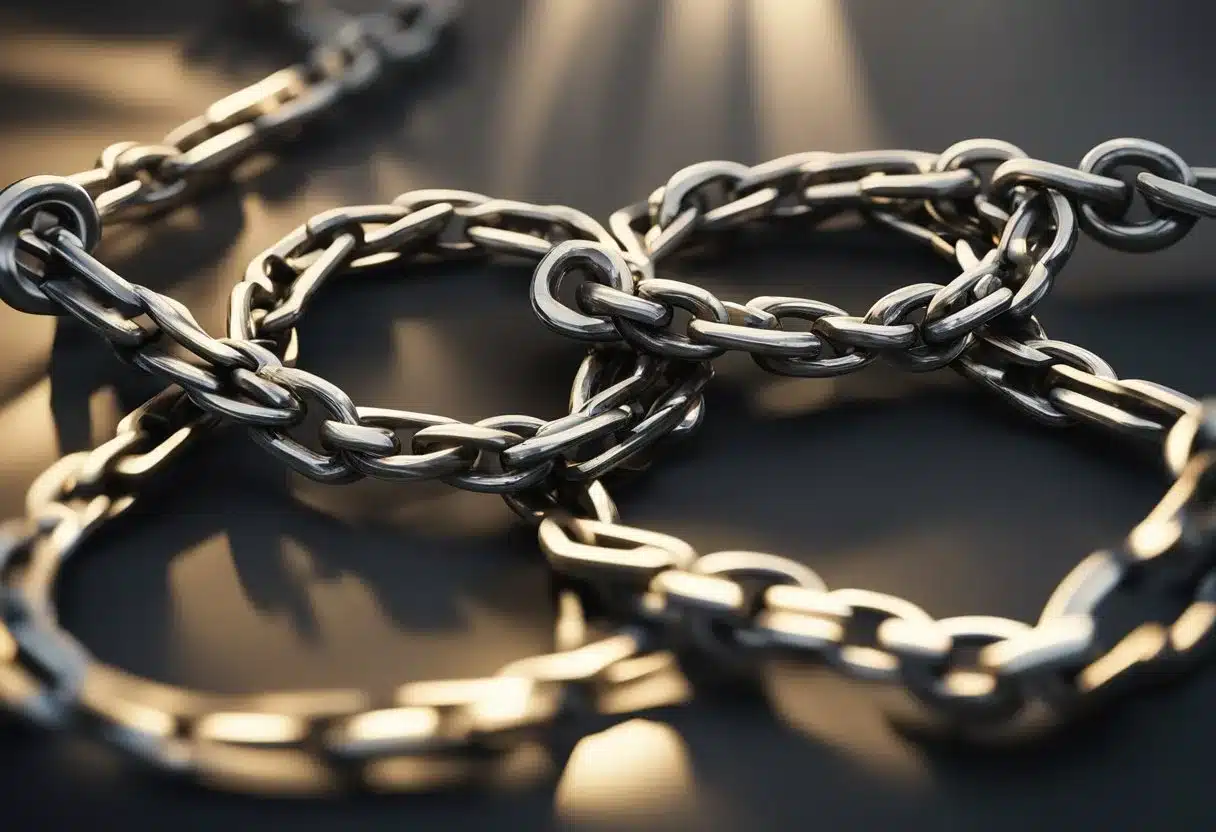Forgiveness is a complex process. It often involves a conscious decision to let go of resentment and thoughts of revenge. This compassionate act can lead to feelings of understanding, empathy, and compassion for the one who hurt you.
The practice of forgiving can occur without the other person’s response and doesn’t necessitate reconciliation. It’s an internal process that can bring a sense of peace and closure to the person who chooses to let go of grievances.
The ability to forgive can have powerful implications for an individual’s mental and physical health.
Many studies have indicated that embracing forgiveness can lead to improved psychological well-being. It also leads to lower levels of stress, anxiety, and depression. It also fosters healthy relationships and can improve societal bonds.
Forgiveness can even have tangible health benefits, leading to lower heart rates and blood pressure, which contribute to overall health.
Key Takeaways
- Forgiveness is the personal process of letting go of resentment which benefits one’s emotional and mental state.
- It can enhance psychological well-being and contribute to physical health improvements.
- The act of forgiving can foster better social relationships and has been linked to various positive outcomes.
The Psychology of Forgiveness

Forgiveness is a transformative process that shifts an individual’s mindset from one marred by negative emotions to a state graced by positive emotions. This psychological paradigm is not only essential for personal well-being but also for sustaining healthy relationships.
Understanding Emotions
Negative Emotions: At the heart of forgiveness is the complex interplay of emotions. Negative feelings such as anger, hurt, and resentment are often the starting point for individuals who embark on the journey of forgiveness. These emotions are typically triggered by perceived harm or injustice.
Positive Emotions: Forgiveness facilitates a transition toward positive emotions. Over time, and often through intentional effort, individuals can experience empathy, compassion, and understanding toward those who have wronged them, thereby liberating themselves from the confines of lingering negativity.
Robert Enright’s Contributions
Dr. Robert Enright, a pioneering psychologist in the study of forgiveness, has developed a framework for understanding how forgiveness can occur. His process model breaks down forgiveness into four phases:
- Uncovering Phase: Recognizing the depth of one’s hurt and pain.
- Decision Phase: Making a conscious choice to forgive.
- Work Phase: Developing a cognitive understanding of the offender and finding empathy.
- Deepening Phase: Finding newfound meaning in suffering and possibly experiencing decreased negative emotions.
His contributions underscore the notion that forgiveness is a choice and a process, not a singular event.
Positive Psychology Insights
Positive psychology contributes to the understanding of forgiveness by emphasizing the benefits it brings to one’s mental health.
Forgiveness is associated with numerous positive outcomes, such as reduced stress and lower risks of mental health issues. It promotes mental health through forgiveness, as individuals who forgive are likely to experience improvements in their overall well-being.
On a psychological level, forgiveness also introduces a positive dynamic in interpersonal relationships.
It is an act that releases both parties from the cycle of negative emotions and allows them to focus on constructive feelings and actions.
Health Benefits of Forgiveness

Forgiveness is not just benevolent behavior but has demonstrable benefits for one’s health. It can play a significant role in improving both mental and physical well-being.
Mental Health Improvements
Forgiveness can lead to notable mental health improvements. Reducing anxiety and easing stress are two of the primary mental benefits.
Studies have shown that the act of forgiving can help diminish the burden of stress and anxiety that often accompanies grudges and resentment.
Furthermore, forgiveness has been associated with decreased symptoms of depression, offering a pathway to emotional healing.
For instance, research highlighted by Taylor & Francis suggests that forgiveness-related interventions may contribute to better mental health outcomes.
Physical Health Advantages
Beyond the realm of mental wellness, forgiveness has physical health advantages. One of the most critical impacts is on blood pressure.
Individuals who practice forgiveness are often found to have lower blood pressure, which is beneficial for overall cardiovascular health.
Additionally, forgiveness might support a healthier immune system, as indicated by studies pointing towards a correlation between forgiveness and improved immunological function.
For instance, ScienceDirect mentions the potential mechanisms by which forgiveness could influence physical health. This includes health benefits ranging from reductions in anger and its associated physiological stress responses to the broader positive effects on one’s health profile.
Emotional Well-Being and Forgiveness

The practice of forgiveness plays a crucial role in enhancing an individual’s emotional well-being. It involves letting go of negative feelings and can lead to a sense of calm and improved self-esteem, ultimately contributing to an individual’s overall life satisfaction.
Improving Self-Esteem
Forgiveness, especially the kind that is emotionally driven, can act as a catalyst for boosting self-esteem.
It allows individuals to move past their own mistakes or the wrongdoings of others, reducing the emotional burden.
Studies have shown that the process of forgiving oneself can be linked to increased feelings of self-worth and a more positive self-view.
Enhancing Life Satisfaction
Forgiveness is also associated with enhanced life satisfaction. By choosing to forgive, individuals often experience a release from the grip of persistent negative emotions.
They allow themselves to embrace a more optimistic outlook on life, which can lead to a more fulfilling and satisfying life experience.
The connection between emotional forgiveness and psychological well-being demonstrates that as people practice forgiveness, their emotional well-being tends to improve, leading to a more content and satisfied life.
Social and Relational Impacts

The practice of forgiveness holds significant influence over social dynamics and relationship health. These impacts manifest in various ways, touching upon deep-seated cultural values and interpersonal connections.
Forgiveness in Relationships
Forgiveness within personal relationships often fosters a reconciliation process, repairing bonds and restoring trust.
Research indicates that forgiveness is positively associated with relationship well-being, suggesting its role in enhancing the quality of connections between individuals.
For example, couples who engage in forgiveness are likely to experience improved communication and empathy, leading to a more robust and fulfilling partnership.
- Compassion: Integral to the process of forgiveness, it allows individuals to understand and empathize with the wrongdoer, thus facilitating healing.
- Trust: A vital component of any relationship, it can be rebuilt through acts of forgiveness, albeit gradually and with sustained effort.
Community and Cultural Aspects
At a communal level, forgiveness often intertwines with culture, reflecting societal values and norms around conflict resolution.
Cultural practices around forgiveness can dictate how communities encourage individuals to forgive, influencing the overall emotional health of the group.
For instance, some cultures embed forgiveness into their collective identity, viewing it as an essential step towards maintaining harmony and cohesion within the group.
- Connection: Forgiveness can act as a bridge, mending societal rifts and fostering a sense of belonging and unity.
- Empathy: Cultural narratives that emphasize understanding and shared human experience can facilitate forgiveness on a community scale.
The Process of Forgiveness

The journey of forgiveness is a personal and transformative process that begins with a decisive moment and involves intentional actions. This intentional pathway often leads to emotional healing and improved mental health.
Deciding to Forgive
Forgiveness is fundamentally a choice, a decision one makes to let go of resentment and thoughts of retribution.
Decisional forgiveness is this initial step where individuals make a conscious decision to forgive, regardless of whether they truly feel forgiving. It is an explicit commitment to change one’s approach towards an offender. This cognitive decision sets the stage for the possibility of emotional healing, which may or may not follow.
Reach Method of Forgiveness
The Reach Method of Forgiveness is a structured process developed to aid in forgiving personal offenses.
‘REACH’ is an acronym that stands for recalling the hurt, empathizing with the offender, giving an altruistic gift of forgiveness, committing oneself publicly to forgive, and holding onto that forgiveness.
Each step is an action meant to further the process of forgiveness:
- Recall the Hurt: Acknowledge the injury without suppressing or denying the pain.
- Empathize with the Offender: Attempt to understand the circumstances or perspective of the person who caused the hurt.
- Altruistic Gift of Forgiveness: Offer forgiveness as a kind-hearted gift to the one who wronged you, reflecting on times when one was forgiven.
- Commit Publicly: Make a public or private statement of forgiveness to solidify the decision.
- Hold onto Forgiveness: Maintain the stance of forgiveness, especially when doubts and memories resurface.
Overcoming Negative Emotions

Forgiveness is a powerful tool in resolving emotional turmoil. It has the potential to release an individual from the grip of harmful emotions and facilitate a more peaceful mindset.
Letting Go of Negative Feelings
When individuals hold onto anger and regret, it can hinder their emotional well-being. By choosing to forgive, they allow themselves to release these challenging emotions.
There is substantial evidence indicating that the act of forgiveness can be beneficial for one’s mental health. This includes leading to reduced stress and a decrease in negative feelings.
This process is not just about others, but about allowing oneself to move forward without the weight of past negativity.
Dealing with Resentment and Bitterness
Resentment and bitterness are often the result of nurturing grudges over perceived wrongs. These emotions contribute to a state of chronic hostility, which, if unresolved, may have long-term impacts on health and relationships.
Forgiveness interventions aim at transforming these feelings into understanding and compassion. Effectively dealing with these emotions can lead to improved interpersonal dynamics and personal serenity.
It is not about condoning harmful actions or denying the impact of the offense, but rather about liberating oneself from the cycle of revenge and unforgiveness.
Finding Peace through Forgiveness

Choosing to forgive is a complex decision that often requires one to overcome emotional barriers, yet it is an imperative step towards emotional wellbeing. This personal choice can be transformative both for the individual who forgives and for the recipient of forgiveness.
The Gift of Forgiveness
Forgiveness is an altruistic gift that can change one’s perspective and promote healing. It is not an obligation; rather, it is a choice to let go of grievances.
When individuals decide to forgive, they often do so with the intention of unburdening themselves from the negative emotions tied to past offenses. This process is akin to bestowing a gift—not necessarily on the one who wronged them, but on themselves, facilitating peace and granting the freedom to move forward.
- Learning: Forgiveness allows individuals to learn from the situation and helps prevent the recurrence of similar issues.
- Perspective: It offers a new viewpoint, enabling one to see the situation and the offender in a different light.
Self-Forgiveness
Self-forgiveness is equally vital to personal growth and emotional well-being. It involves acknowledging one’s own mistakes and granting oneself the same compassion and understanding that one might offer to others.
This self-directed forgiveness is a choice that leads to:
- Acceptance: Recognizing and accepting one’s own faults without harsh judgement.
- Learning and Growth: Making room for growth by learning from the experience rather than being mired in self-critique.
Self-forgiveness is a foundational step in mending self-esteem and fostering resilience. It is a deliberate process that requires practice and patience, reflecting a commitment to personal healing and self-improvement.
The Role of Forgiveness in Spirituality and Ethics

The concepts of forgiveness intersect deeply with spiritual beliefs and ethical principles, often leading to healthier relationships and psychological well-being. These dimensions are integral in understanding the overarching impact of the practice of forgiveness.
Religion and Forgiveness
In many religious traditions, forgiveness is considered a virtue that reflects divine qualities. For example, Christianity emphasizes the importance of forgiving others, mirroring the forgiveness granted by God.
This act of pardon is often linked with spiritual growth, suggesting that forgiveness therapy could be seen as a path to greater spiritual enlightenment.
The teachings of patience, kindness, and respect are prevalent in religions such as Islam and Buddhism as well. These religions advocate for forgiveness as a means to transcend personal grievances. Such practices are not only conductive to personal peace but also promote communal harmony.
Ethical Considerations of Forgiveness
From an ethical standpoint, forgiveness can bridge the gap between justice and empathy.
Ethically, to forgive someone reflects a conscious choice to forgo resentment, which could be considered an expression of both kindness and respect to oneself and others.
Forgiveness within ethical discourse often grapples with the tension between holding individuals accountable and offering them a chance for rehabilitation.
The role of forgiveness therapy here is significant. It can serve as a tool for conflict resolution, encouraging individuals to move past their hurt while still recognizing the wrongdoings.
This process underscores the ethical aspect of forgiveness that balances moral judgments with compassion and understanding.
Practical Approaches to Forgiveness

Practical approaches to forgiveness often incorporate specific exercises and the support of qualified professionals. These strategies can enable individuals to process feelings of hurt in a constructive manner, leading to emotional healing.
Forgiveness Exercises
Learning to forgive is a skill that can be honed through various exercises.
Meditation and prayer are practices that focus the mind and foster a state of compassion and release.
Particularly, guided meditation sessions can help individuals visualize the act of forgiveness and encourage a peaceful letting go of grudges.
Journaling is another potent tool in the forgiveness toolkit. Writing about one’s feelings and experiences with the hurt can offer clarity and a way to work through tangled emotions.
- Meditation: Daily sessions focusing on breath and release.
- Prayer: Spiritual reflection and seeking peace.
- Journaling: Regular entries that explore and express the forgiveness process.
Professional Support
When dealing with deep-seated issues of non-forgiveness, engaging a Mental Health Professional can provide the necessary guidance for moving forward.
These professionals can introduce Forgiveness Therapy, a structured approach that helps individuals understand the nature of forgiveness and apply it effectively in their lives.
This therapy can include the exploration of forgiveness as a concept, recognising harmful patterns, and actively working towards letting go of resentments.
- Mental Health Professional: Counselors or therapists trained in emotional healing.
- Forgiveness Therapy: Structured programs aimed at developing forgiveness skills.
Understanding and Moving On

In the process of forgiveness, individuals often find themselves revisiting the events that caused distress but doing so from a place of understanding to facilitate personal growth and healing.
Perspectives on Past Transgressions
Forgiveness begins with acknowledging the pain and trauma of past events without condoning the actions that caused them.
Individuals may look back at the circumstances surrounding transgressions to gain clarity. By examining past transgressions through a lens of compassion rather than blame, one can start to release the hold of resentment and muscle tension that often accompanies the memories of being wronged.
- Reflection:
- Understanding trauma and pain
- Differentiating the transgression from the person
- Recognition:
- The harm done is real and significant
- The act of forgiving doesn’t excuse the wrongdoing
Growth and Personal Development
The journey of forgiveness is intricately linked with personal development.
It is not about forgetting or dismissing the harm, but rather, about letting go of the anger and bitterness that hampers one’s own well-being.
Through self-compassion, individuals empower themselves to break free from the cycle of pain and embrace moving on.
- Growth Elements:
- Committing to healing instead of harboring grudges
- Embracing hope for a more positive future
- Moving Forward:
- Moving On entails a conscious decision to leave behind the pain
- Growth manifests as increased resilience and emotional maturity
Frequently Asked Questions

The following questions delve into the multifaceted benefits of forgiveness on an individual’s mental, physical, and interpersonal well-being, alongside its spiritual implications.
How does forgiveness improve personal health and well-being?
Forgiveness can lead to a reduction in stress and negative emotions, which are often associated with health issues such as hypertension and mental strain.
Research suggests that engaging in forgiveness interventions can contribute to better overall health by alleviating psychological burdens.
What are the psychological effects of practicing forgiveness?
Practicing forgiveness is linked to lower levels of depression, anxiety, and hostility. It can enhance feelings of optimism and self-efficacy.
Studies indicate that forgiving oneself and others is vital for mental peace and psychological resilience.
Can forgiveness contribute to emotional healing and how?
Yes, forgiveness can be a powerful tool for emotional healing.
It allows individuals to release resentment and anger, leading to emotional relief and fostering the resolution of inner conflicts.
This is underpinned by evidence that indicates relational and spiritual benefits to forgiving oneself or others.
In what ways does forgiveness influence physical health?
Forgiveness is associated with beneficial physical outcomes such as lower blood pressure, reduced risk of heart disease, and improved immune function.
The release of negative emotions through forgiveness can decrease stress hormones and promote physical well-being.
What role does forgiveness play in strengthening relationships?
Forgiveness can rebuild trust and restore bonds in relationships. It plays a critical role in conflict resolution. It also helps in maintaining strong, healthy interpersonal connections.
The act of forgiving is recognized for its ability to overcome rifts and enhance social harmony.
How does forgiveness align with biblical teachings and enhance spiritual life?
Forgiveness is a central tenet in biblical teachings. It emphasizes mercy and reconciliation. It is essential for spiritual growth and aligns with principles of compassion and unconditional love. Many faith-based communities view forgiveness as a path to divine connection and inner peace, as described by spiritual frameworks.